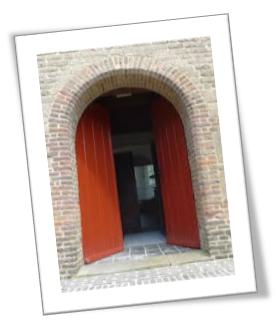The Confession of Faith Article 29 Of the Marks of the True Church, and Wherein She Differs from the False Church
The Confession of Faith Article 29 Of the Marks of the True Church, and Wherein She Differs from the False Church
The marks of the true church are mentioned in this article. Previously we have seen how the true doctrine must be preached in the true church. The second mark mentioned is that the sacraments must be administered according to the Lord's institution. We will not say much about this second mark, as we hope to speak of them in later articles, D.V.
This time we will try to say something about the third mark, namely, "If church discipline is exercised in punishing of sin." As a consequence of sin, church discipline is necessary; there must be order in the church as well as in the family and in the country. God is a God of order. In 1 Corinthians 14:40 we read, "Let all things be done decently and in order." And in Matthew 18 the Lord describes how this discipline must be exercised. God's Word is very clear about the discipline which must be maintained and which is so necessary for the welfare of the church.
 Since the second world war there has, in general, been less strictness in the discipline in the families, which in turn has also had its effects in the schools. This is often stated in the opposite order, so that the schools are blamed for the revolutionary life of many young persons. We cannot deny that the schools have a great influence upon the youth in our days, but if we as parents were stricter, we could, with God's help, offset much of this influence. In general we are too busy with many other things, and forget our main task in bringing up our children, for whom, as Solomon says, we may not spare the rod. Governments, judges, the military services, etc., all have become more lenient, and I think that this has had its influence on church discipline as well. However, the main reason has not yet been mentioned, and that is the backsliding from God's Word.
Since the second world war there has, in general, been less strictness in the discipline in the families, which in turn has also had its effects in the schools. This is often stated in the opposite order, so that the schools are blamed for the revolutionary life of many young persons. We cannot deny that the schools have a great influence upon the youth in our days, but if we as parents were stricter, we could, with God's help, offset much of this influence. In general we are too busy with many other things, and forget our main task in bringing up our children, for whom, as Solomon says, we may not spare the rod. Governments, judges, the military services, etc., all have become more lenient, and I think that this has had its influence on church discipline as well. However, the main reason has not yet been mentioned, and that is the backsliding from God's Word.
No longer is the Word of God the center of our life, and then the next step is to forget the Law. We can see what a disorder there is in our society with being lenient, and it should be a warning for all churches that this shall also be the case with them in the future if church discipline is not maintained. Moreover, the Lord will withdraw Himself if sin is no more punished. In His law He has revealed His will, and His will is good; when we will not walk according to it, then His anger will be kindled against us. Discipline must be maintained to honor God, as He hates sin; it is also, we repeat, necessary to the welfare of the church.
Our article summarizes these marks by saying, "In short, if all things are managed according to the pure Word of God, all things contrary rejected, and Jesus Christ acknowledged as the only Head of the church." This includes everything in respect to the Truth, but it also emphasizes that Christ is the Head of the church. Although He ascended on high and sitteth at the right hand of the Father, He is the Head of the church, always working to their benefit, as described in Lord's Day 19. That Christ is the Head of the church is partially denied by Rome, as they make the Pope the vicar of Christ. This doctrine gradually found entrance in the church of Rome during the eighth and eleventh centuries, but is clearly against the Word of God. The church militant has an invisible Head, and there is no basis given in God's Word for the doctrine of Rome, which nevertheless they still maintain.
Rome misuses and misinterprets Matthew 16:18, where it is written, "And I say unto thee that thou art Peter, and upon this rock will I build My church." For the word 'rock', they use the word 'petra'. They then reason that petra and Peter are the same, but this a human invention to justify their error and make the popes the successors of Peter.  The word 'rock' used in the above text refers to Peter's confession. How much better it is that the church has an invisible Head in heaven. He knows of all their needs and is ready to help. Stephen saw Him standing at the right hand of God the Father. This is an inexpressible comfort for the church militant, who have no rest here in time. They may know that their Head is also watching the enemies who are trying to destroy them and that these enemies will not overcome.
The word 'rock' used in the above text refers to Peter's confession. How much better it is that the church has an invisible Head in heaven. He knows of all their needs and is ready to help. Stephen saw Him standing at the right hand of God the Father. This is an inexpressible comfort for the church militant, who have no rest here in time. They may know that their Head is also watching the enemies who are trying to destroy them and that these enemies will not overcome.
Thus we have tried to explain something about the marks of the true church. Has this any value for us today? What is the condition of many so-called 'Reformed' churches in our days? Are there guidelines as to where we may find these marks and where they are not to be found?
There are many who no longer bow before God's Word. Atheists are allowed to become ministers, elders, deacons; women may also be office-bearers. In the administration of the sacraments, an historical faith is considered to be sufficient. Children of members and non-members are baptized, and no discipline is maintained. Others no longer believe the first chapters of the Bible, saying that it is only symbolical language and not real history when it speaks of the creation and fall of man. Many speak of presupposed regeneration of all children, saying that they must only show this in their life and they will be saved. Every member is a child of the covenant and must take part in the Lord's Supper. We have to say with sorrow that the marks which our fathers have given us in this article based upon God's Word have become very vague or have disappeared. It is sad to write this, knowing that these churches have had an influence in the past century here in our country.
The preaching of the three covenants has had a great influence, often leading to the denying of man's state of death. When we leave any ability in man to do something for his own salvation, then we are going in that direction. The responsibility of man is over-emphasized and the sovereignty of God is under-emphasized. I read in a sermon on John 15:11 that a certain minister said that the Lord does not want sad people, but that they should be joyful. But how? Does the Lord not work a sorrow?
Friends, I wish I could write differently about the churches, but it is a sad time. But we should not forget ourselves. Be careful that we not say with Jeremiah's contemporary, "Trust ye not in lying words, saying: The temple of the Lord, the temple of the Lord, the temple of the Lord, are these."
In the churches around us we find so much lacking that we must say of many of these that they have departed from the Word of God. This is a very serious offence, for the Lord Himself has said, "And if any man shall take away from the words of the book of this prophecy, God shall take away his part out of the book of life, and out of the holy city, and from the things which are written in this book."
However, when we are busy with others, there is a danger that we forget ourselves. The question must be asked, "How is it with the marks of the true church' in our midst?" I do not dare to say that we are the only church where the truth is yet taught, nor do we deny that the Lord is yet in our midst and the work of the Holy Spirit is yet found here and there. But there is a big difference from former days. In our days we hear so little of the experience of God's people who, by the grace of God, may speak about that which the Lord has done for them and in them. It is a privilege when persons may know what the Lord has done for them, but before comfort and strength is received of it, the application of it cannot be missing. Because so little goes out from God's people, nobody becomes jealous of them. In this way the authority of true religion is undermined, and the world is given our attention, causing world conformity to come into our midst. This can be seen in our homes, in our pursuit of fashion, of hair styles, etc., but can also be seen in our churches. Where is the simplicity of former times?
 Does this have something to do with the marks of the true church? We may not deny that these are great dangers. Usually the changes in the church are gradual, so that step by step the marks of the true church become more vague and undiscernible. Notwithstanding these concerns, we may believe that the pure preaching is still among us, namely, death in Adam and life in Christ. Paul expressed it in this way: "But we preach Christ crucified." To this pure preaching also belongs the maintaining of the forms of unity. These are not the same as God's Word, but they are according to the Truth.
Does this have something to do with the marks of the true church? We may not deny that these are great dangers. Usually the changes in the church are gradual, so that step by step the marks of the true church become more vague and undiscernible. Notwithstanding these concerns, we may believe that the pure preaching is still among us, namely, death in Adam and life in Christ. Paul expressed it in this way: "But we preach Christ crucified." To this pure preaching also belongs the maintaining of the forms of unity. These are not the same as God's Word, but they are according to the Truth.
Another concern is the pure administration of the sacraments. We must be careful that the administration of the Lord's Supper does not become the same as in other churches, where an historical faith is held for the true saving faith. This is then a ground on which to partake at the Lord's table. The knowledge is often so little of the Lord and ourselves, and it is then incomprehensible how the people dare to take the bread of the children.
The third mark of the true church was discipline. It is yet found in the preaching and in practice, but not as strictly as in former times. This is also a hand-writing on the wall. All these things together show us the need for carefulness in our midst and an asking of the Lord for the presence of His Spirit, so that we may not be left to ourselves.
The marks of the true church are to be known, but it is so necessary that we come to the assurance that you and I, each personally, are living members of this church. Although it is often forgotten, how necessary it is to examine ourselves. Our fathers not only gave the marks of the true church, but also of the true Christian, since they added, "With respect to those, who are members of the Church, they may be known by the marks of Christians: namely, by faith; and when they have received Jesus Christ the only Savior, they avoid sin, follow after righteousness, love the true God and their neighbor, neither turn aside to the right or to the left, and crucify the flesh with the works thereof." These words of the confession include the practice of true religion in personal experience.
With historical faith we are left outside of Christ, but living faith becomes visible. When the Lord begins, He gives faith and we are implanted in Christ. At God's time such speak of what the Lord has done. The true and living members of the church receive faith as a gift of God and they begin to hate sin and to ask for the Lord and His service. However, this obedience is only in a small beginning. The struggle between the old and the new man continues to the end of their life. In us there is no strength in that warfare, but the Lord promises, be of good courage, for I have overcome the world and all enemies.
Under the administration of the Holy Spirit we not only learn our misery, but at God's time He will make room in our hearts for Christ, so that we may flee to Him. Christ Himself has said, "I am the resurrection and the life, the Alpha and Omega, the first and the last." It will remain a church militant, but they will receive the victory at the end, for the Lord will not forsake the work of His hands.
Just as the true church and the true Christian have their marks, likewise the false church also. She takes power and authority to herself. All churches which give more power and authority to men than to God are false churches. Another mark of this false church is that the sacraments are not administered according to God's Word, but rather according to their own insight. Neither is church discipline administered. And, besides all this, they persecute the true church, those who want to live according to God's will. You can understand that in this the authors of the confession speak especially of Rome.
In the 146th session of the Synod of Dordt the representatives of the foreign churches unanimously testified that in the confession not one dogma was found which was against the Word of God. They urged their hearers to stay with this doctrine. It is my desire, and I hope also yours, to live and die in accordance with this doctrine of free grace.

Add new comment